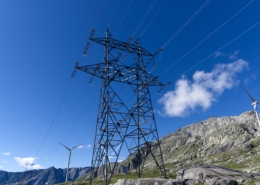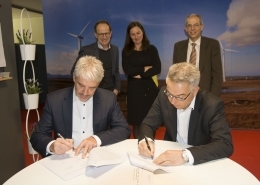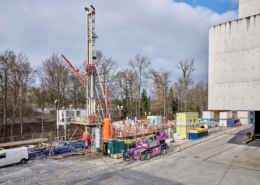Net-zero greenhouse gas emissions and sustainable fuels: FOEN and FOCA join SWEET
The Swiss Federal Office of Energy's (SFOE) SWEET funding programme relies on cooperation: the call for proposals on "Critical Infrastructures" was launched in collaboration with the National Centre for Climate Services (NCCS) and the Federal Office for Civil Protection (FOCP). The SFOE is preparing two future calls for proposals together with the Federal Office for the Environment (FOEN) and the Federal Office of Civil Aviation (FOCA). Why? What do the offices involved hope to achieve? Energeiaplus asked.
Andreas Haselbacher is responsible for tenders at SWEET. Why does the SFOE bring other players on board?
Andreas Haselbacher: SWEET is intended to support research that helps us to achieve the goals of long-term energy and climate policy. SWEET therefore also focuses on interdepartmental topics that are not only the responsibility of the SFOE, but also of other offices such as the FOEN and the FOCA. This joint approach enables us to design the calls for proposals in line with requirements and to make targeted use of the federal government's financial resources.
A call for tenders is planned for net zero greenhouse gas emissions - together with the FOEN. What is the focus of the tender?
Andreas Haselbacher: The Federal Council has decided that, on balance, Switzerland should not emit more greenhouse gases in 2050 than natural and technical storage facilities can permanently and safely absorb. Emissions that are difficult to avoid must be offset by then using CO2 capture and storage technologies (CCS) and negative emission technologies (NET). The former capture CO2 directly where it is produced by plants in the industrial and waste sectors.
NETs permanently remove CO2 from the atmosphere to compensate for emissions that cannot be captured directly. According to the Federal Council's climate strategy, residual emissions of around 12 million tonnes of CO2 equivalents will remain in 2050, mainly from industrial processes (especially cement production), waste recycling and agriculture. The focus of the calls for proposals is on the question of how these emissions, which are difficult to avoid, can be made climate safe in concrete terms. The challenges are great because there are still many open questions surrounding the development and use of CCS and NET.
What is interesting about the collaboration with the FOEN from the SFOE's point of view?
Andreas Haselbacher: Greenhouse gas emissions are a very good example of a cross-cutting issue that requires the expertise of several offices. They are the biggest driver of climate change and arise predominantly from the supply and use of energy. It therefore makes sense for the FOEN and the SFOE to work together. In this call for proposals, questions relating to energy demand or efficiency are the responsibility of the SFOE. The FOEN is in charge of developing favourable framework conditions for CCS and NET and embedding them in climate policy. Here, too, we want to work together to ensure that the funds are used as effectively as possible.
Sophie Wenger, you are responsible at the FOEN for developing framework conditions for negative emission technologies. What does the FOEN expect from its participation in the SWEET call for net zero greenhouse gas emissions?
Sophie Wenger: It is urgent to address open questions around the expansion of CCS and NET now, so that we can achieve the necessary scaling up by 2050. This is the only way we can achieve the net zero target. At the same time, the promotion of CCS and NET also offers opportunities for Switzerland. Our research and industry are in some cases world leaders in the development of solutions. I am thinking, for example, of the ETH start-up Climeworks, which is currently operating the world's largest plant for directCO2 air capture in Iceland. SWEET aims to promote application-oriented innovation in a targeted manner, linking research, industry and the public sector over a period of several years. Such a programme is ideal for addressing the challenges around CCS and NET. It does not yet exist in this form in the FOEN.
A great deal of research is already being carried out on negative emissions. The Swiss Federal Office of Energy recently approved a project on this topic as part of the pilot and demonstration programme - the DemoUpCARMA project. It is intended to demonstrate and scale up the generation of negative emissions through the permanent storage of CO2 in concrete (in Switzerland) and in geological reservoirs (abroad). To what extent are findings from such projects relevant to the call for proposals?
Andreas Haselbacher: Such findings are very relevant for the SWEET funding programme, especially for the upcoming call for proposals on the topic of difficult-to-avoid greenhouse gas emissions and the net zero target. The findings from DemoUpCARMA will help us in the preparation of the call, i.e. in the delineation of the topic areas and the definition of the research questions, for example in the areas of incentives, scaling and social acceptance.
Sophie Wenger: DemoUpCARMA is an ambitious and comprehensive project with around 20 project partners, which involves a wide range of clarifications relating to energy and life cycle assessments, scaling in Switzerland, CO2 transport abroad and the design of the legal framework. Such projects can help us to quickly raise the level of knowledge and identify knowledge gaps, so that we can address the next questions and the questions after that in the SWEET tender. After all, we need to scale up CCS and NET comparatively quickly if we want to achieve the long-term climate targets.
The call is due to be published in early 2024. Why is it being communicated now?
Sophie Wenger: We would like to invite research and industry to submit projects to the SFOE and FOEN now, which, like DemoUpCARMA, will contribute to the development of the call. For example, by demonstrating the practical implementation of known approaches or showing promising new approaches. Of particular interest are projects that can deliver concrete results by late summer 2023. Support is provided within the framework of the existing research credits and innovation programmes of the SFOE and the FOEN.
Sustainable fuels and combustibles is another topic SWEET intends to address. Cooperation with the FOCA is planned here. Is this primarily about fuels for air traffic?
Andreas Haselbacher: It's not just about aviation fuels, but they play a very important role. In 2019, for example, air traffic contributed around 11% of Switzerland's greenhouse gas emissions, almost exclusively through international traffic. According to the long-term climate strategy, international air traffic should, as far as possible, cease to cause climate-impacting emissions by 2050. In addition, however, we would also like to investigate how sustainable fuels can be used in other sectors, especially in industry, which contributed around 24% to Swiss greenhouse gas emissions in 2019.
Boris Stolz, you look after renewable fuels for aviation at the FOCA. What interests the FOCA in the SWEET call?
Boris Stolz: The Federal Council has stated in Switzerland's long-term climate strategy that renewable synthetic fuels are one of the most promising measures for reducing the harmful climate impact of aviation by 2050. A major research effort is needed to fulfil this potential. Accordingly, we value the cooperation with the SFOE. Here, too, it makes sense to pool Swiss innovative strength.
Why does the SFOE consider the collaboration with the FOCA to be an enrichment?
Andreas Haselbacher: Fuels and combustibles are another example of a cross-office issue. The FOCA is responsible for ensuring that Swiss air transport achieves the goals of the long-term climate strategy, and sustainable fuels play a central role in this. Depending on the method used, the production of these fuels can require considerable amounts of energy, which must be provided from renewable sources. In addition, sustainable fuels could play an important role in security of supply as a storage medium. These are issues addressed by the SFOE. A holistic view is therefore essential.
ETH Zurich recently demonstrated the production of fuel from the sun and air. To what extent are existing research findings being incorporated into the call for proposals for "sustainable fuels"?
Boris Stolz: The Swiss research location is in part a world leader in this field. These results form the basis for further research and development activities, such as those envisaged in this call. Accordingly, when formulating the research questions in this call, it should be taken into account where research stands today and what steps are needed next. This is precisely one of the aims of this call, to be able to make as large a contribution as possible to the scaling up of sustainable and low-cost fuels (especially for air transport). This is ensured not only by experts from the SFOE and FOCA, but also by a scientific support group.
Andreas Haselbacher: In addition to the results from ETH Zurich, we will also incorporate research results from other projects that deal with sustainable fuels.
Interview: Brigitte Mader, Communication Federal Office of Energy
 Shutterstock
Shutterstock
 shutterstockSzenariorahmen 2030/2040: Darauf baut das Stromnetz der Zukunft
shutterstockSzenariorahmen 2030/2040: Darauf baut das Stromnetz der Zukunft  @EnergieSchweizLiebes BFE, so könnte die Schweiz Strom sparen.
@EnergieSchweizLiebes BFE, so könnte die Schweiz Strom sparen.  BFELa première contribution pour l’utilisation directe de la géothermie est accordée au projet EnergeÔ Vinzel
BFELa première contribution pour l’utilisation directe de la géothermie est accordée au projet EnergeÔ Vinzel  Le stockage en aquifère pour alimenter les réseaux de chaleur
Le stockage en aquifère pour alimenter les réseaux de chaleur 
 Benedikt Vogel
Benedikt Vogel
Die üblichen Worthülsen – leider.
Und höchst problematisch erneut die „gesellschaftliche Akzeptanz“. Die Projekte verwenden immer grosse Stücke darauf, diese zu schaffen. Doch technisch-institutionelle Innovation im Hinblick auf gewisse Ziele schafft sich automatisch gesellschaftliche Akzeptanz, nämlich dann, wenn sie betreffend dieser Ziele effizient ist. Das kann also hier nicht gemeint sein. Was ist es dann? Es ist die Frage: „Wie setzte ich ineffiziente Lösungen im gesellschaftlichen und politischen Prozess durch.“